Nuclear energy does more than provide the world with a relatively safe way to generate power. It is also an essential component of modern medicine. If you’ve had an MRI, a CAT scan, or even a simple X-ray performed, then you’ve experienced the benefits of this niche field. There are also some disadvantages that must be considered as well, so here is a look at the pros and cons of nuclear medicine.
The Pros of Nuclear Medicine
1. It allows for an accurate diagnosis.
Complex medical procedures have become a great deal safer thanks to the technologies of nuclear medicine. Instead of exploratory surgeries, a detailed internal image can be taken instead. It is simple, safe, and eliminates the need for many of the dangerous procedures of the past.
2. It allows for early disease detection.
For diseases like cancer, early detection is critical for a patient to receive a high likelihood of long-term survival. Nuclear medicine makes it possible to find early stage cancers and other illnesses or health problems so that an effective treatment plan can be developed.
3. It provides a treatment alternative.
Nuclear medicine isn’t just about diagnosing health problems. It is also used to cure them or send them into remission. Radiation treatments, chemotherapies, and other cutting edge options give patients a new hope for life when none in the past would have existed.
The Cons of Nuclear Medicine
1. It is very expensive.
Nuclear medicine is quite expensive on all fronts. The technology behind the therapies or diagnostic equipment have high installation and maintenance costs. These costs are passed along to each patient so the medical provider can make money. It isn’t uncommon for a CAT scan to be above $4,000 in price before insurance.
2. There are health risks.
Because radiation is a side effect of nuclear medicine, consistent exposure to it can cause certain health issues. This is especially true in infants, toddlers, the elderly, and women who may be pregnant. So great are the risks, in fact, that many doctors recommend alternative treatments.
3. It isn’t 100% guaranteed.
Although nuclear medicine offers some of the best medical treatment options available today, it still isn’t a fool-proof system. No medical procedure is guaranteed to work 100% of the time.
For many people, the main disadvantage of nuclear medicine is the cost of it. If the costs can be managed, then the benefits almost always outweigh the other disadvantages which may be present.
Crystal Lombardo is a contributing editor for Vision Launch. Crystal is a seasoned writer and researcher with over 10 years of experience. She has been an editor of three popular blogs that each have had over 500,000 monthly readers.


















